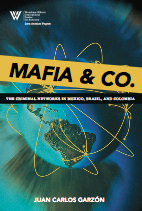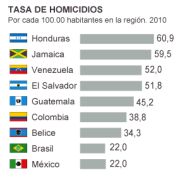By Charles Davis for Aljazeera. Rivas, Nicaragua – Ravished by violent drug trafficking organisations flush with prohibition profits, Central America is now one of the deadliest places on Earth, with Honduras experiencing even more murders per capita than Iraq. That’s led some politicians to start talking about something they never would have considered just a decade ago, at least publicly: breaking with the militarised, literal war on drugs favoured by the United States in favour of decriminalisation – and perhaps even outright legalisation. But contrary to what one might assume, it’s not the «anti-American» leftists leading the charge, but the reliably pro-American heads of the region’s center-right governments.
Indeed, when it comes to the drug war, it’s the revolutionary socialists siding with the empire. So it’s been left to the likes of Guatemalan President Perez Molina – a former general elected last year on a platform of going after drug traffickers with an «iron fist» – to state the obvious: the status quo isn’t working. And it about time to start considering alternatives. «We have to talk about decriminalisation of the production, the transit and, of course, the consumption» of drugs, he recently told CNN en Espanol, stating something that previously only ex-heads of state have had the courage to say.
Perhaps even curiouser still, the reaction from Molina’s fellow conservatives in the region hasn’t been overwhelmingly negative. Echoing his call for an open and thorough debate about the war on drugs, Costa Rican President Laura Chinchilla in March told reporters in San Jose that, «If we keep doing what we have been doing when the results today are worse than 10 years ago, we’ll never get anywhere and could wind up like Mexico or Colombia.» To give you an idea how fast the discussion has changed, less than year earlier Chinchilla rushed to Guatemala for a press conference with Molina’s predecessor to denounce as «naive» a proposal from a group of former Latin American leaders to legalise marijuana.
When Molina hosted a conference to talk drug policy, the region’s leftists, El Salvador’s Mauricio Funes and Nicaragua’s Daniel Ortega, were no-shows, saying they quite like the status quo, thank you.
Legalise it
«Legalisation doesn’t make sense,» Ortega remarked around the same time other leaders in the region were talking decriminalisation in Guatemala. «It’s as if we were to say, ‘were beaten’. It would be to legalise crime,» he said, making the obvious but unassailable point that legalising something that is currently a crime would be like legalising a crime.
A leader of the Sandinista rebels who helped topple the US-backed Somoza dictatorship in 1979, Ortega returned to the presidency in 2006 a changed man, making a show of publicly converting to Catholicism. While his Marxist government in the 1980s confiscated the property of absentee landlords and redistributed it to the country’s poor, leading the Reagan administration to back a right-wing insurgency that left over 30,000 dead, today his government is praised by the decidedly not-Marxist International Monetary Fund (IMF) for pursuing «broadly appropriate macroeconomic policies» and generally providing a stable market for foreign investors. The Nicaraguan military now even holds joint training exercises with the same government that not so long ago was busy illegally mining Nicaragua’s ports.
Indeed, the only thing that’s really revolutionary about Ortega these days is his rhetoric. Speaking to a gathering of national police, he justified his support for drug prohibition by channeling fellow drug warrior Fidel Castro, calling the illicit drug trade a product of «savage capitalism». Curiously, Ortega did not denounce the savage capitalists freely selling beer in his country, suggesting drug traffickers would do well to package their product with crass patriotic slogans: «Soy Nica. ¡Como el San Juan!»
«Ortega’s support for the US-led war on drugs is not surprising,» says Michael Shifter, executive director of the Inter-American Dialogue, a think tank based in Washington. «The presidents who have most strongly challenged US drug policy are those who lead countries with high levels of related violence. For a variety of reasons, so far Nicaragua has been spared the high costs of the drug war, so there is little pressure for Ortega to make this a big issue.»
Indeed, Nicaragua is generally considered the safest country in Central America, with traffickers preferring to ship their drugs to bigger markets up north rather than set up shop in the second poorest country in the Western Hemisphere. Nicaragua’s poverty may also help explain its nominally left-wing government’s support for a reactionary war: it means money. Almost immediately after returning to the presidency just over five years ago, Ortega called on the US government to provide Central America with a US $1bn aid package to fight drug trafficking. And that’s not a new thing for him, either: in the late 1980s, after years of fighting a US-backed insurgency fuelled by selling cocaine, his government likewise called for a greater US role in combating drug trafficking in the region.
Drug war gold
The US has thus far declined to offer that billion dollar pot of drug war gold. But even amid an otherwise rocky relationship, the Ortega administration has been rewarded for, as a report from the US embassy in Managua puts it, «protect[ing] its territory as best it could with limited resources». Indeed, the US boasts of having boosted Nicaragua’s military and national police with millions in drug war dollars, enabling it to establish «random checkpoints at strategic points on the national highway system» throughout the country. Foreign aid also helped Nicaragua hire more than 1,300 new officers in 2011, a single-year record, with the European Union also helping to open «a central criminal forensic laboratory» to the tune of $7.4 million.
Read more: http://www.aljazeera.com/indepth/opinion/2012/05/201252791946921607.html


Comentarios
Aún no hay comentarios.